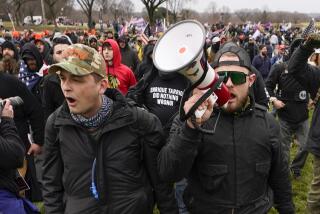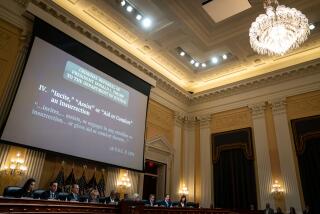Judge deals Libby a setback
- Share via
WASHINGTON — I. Lewis “Scooter” Libby’s decision not to testify in his perjury case damaged a key part of his defense Wednesday, when a federal judge ruled that his lawyers could not introduce once-classified details of his workload without Libby taking the witness stand.
The ruling by U.S. District Judge Reggie B. Walton was one of two setbacks for the defense as it finished presenting evidence in the case without calling any additional witnesses. Walton set closing arguments for Tuesday and said the jury probably would start deliberations Wednesday.
Offering barely two days of testimony, the defense strategy appeared to reflect a hope and belief among Libby’s lawyers that the government had failed to meet its burden of proving the defendant’s guilt beyond a reasonable doubt.
Libby is charged with covering up his role in leaking information about a CIA officer, the wife of a Bush administration critic, to journalists in summer 2003. He has acknowledged he may have misspoken to authorities, but said that was because he was consumed with more important official duties as the chief of staff and national security advisor to Vice President Dick Cheney.
During the trial, Libby’s lawyers have shown that some government witnesses had memory problems of their own, and that information about the CIA operative, Valerie Plame -- the wife of former envoy Joseph C. Wilson IV -- was known to journalists who got the information from sources other than Libby.
But the so-called busy-man defense suffered a blow Wednesday when Walton rejected a defense bid to have admitted into evidence summaries of classified materials by CIA employees who had regularly briefed Libby on intelligence matters.
The summaries were meant to buttress the argument that the weighty issues Libby was handling fogged his ability to recall details about Wilson and Plame. The materials were prepared before the trial after months of sensitive negotiations among Walton, the lawyers and intelligence authorities about what could become public.
Walton said Wednesday that he always understood that the information could become public only if Libby testified. The judge said it would be unfair to the government to now allow the jury to hear the evidence without giving prosecutors the opportunity to cross-examine the former White House aide about it.
Libby’s lawyer Theodore Wells Jr., who announced Tuesday that neither Libby nor Cheney would be called as witnesses in the trial, said in court Wednesday that the information should still be permitted. He asserted that, by requiring Libby to take the stand in his own behalf as a condition for introducing the evidence, the judge was putting an “impermissible burden” on the client’s right under the Constitution to a fair defense.
But Walton said that to allow that would encourage gamesmanship. “If the Court of Appeals wants to tell me that this kind of process can occur ... I think we turn this whole process into a game. It’s too much of a game now,” the judge said.
“If I get reversed on that one, maybe I need to hang up my spurs,” Walton added. “I am convinced that is not a winning position.”
The defense rested Wednesday without calling the CIA witnesses but with a lawyer reading a list of some of the matters that Libby was dealing with at a time when the government says he was focused on rebutting Wilson.
The lawyers also introduced articles from the Wall Street Journal and National Review, which included criticism of the three-year federal inquiry that led to Libby being charged.
Wilson wrote an opinion piece in the New York Times on July 6, 2003, that accused the Bush administration of twisting prewar intelligence on Iraq. Plame was identified eight days later in a newspaper column by syndicated columnist Robert Novak.
The trial has turned up new details of the involvement of both Cheney and Libby in discrediting Wilson, which probably would have subjected them to tough questions by prosecutors had they testified.
Walton also rejected a defense request to raise further questions about the credibility of Tim Russert, moderator of NBC’s “Meet the Press.” Russert is one of three journalists who had conversations with Libby that authorities say Libby lied about to investigators. Libby has said it was Russert who first gave him information about Plame, an assertion Russert denied in court last week.
The defense has contended that Russert received special treatment from the government because he was allowed to give a statement under oath in his lawyer’s office rather than appear before the grand jury.
Wells asked Russert last week about whether he knew if lawyers were permitted to accompany their clients into the grand jury room. Russert responded that he did not know.
Wells said this week that he had found three videotapes of Russert appearing to know full well that lawyers were barred from the grand jury, including a television appearance he made relating to the Monica S. Lewinsky case during the Clinton administration. Wells said he wanted to show them to the jury to discredit Russert.
Walton declined to permit it, saying that the apparent contradiction did not go to the heart of the testimony that Russert offered, including discussions he had with Libby.
More to Read
Sign up for Essential California
The most important California stories and recommendations in your inbox every morning.
You may occasionally receive promotional content from the Los Angeles Times.













